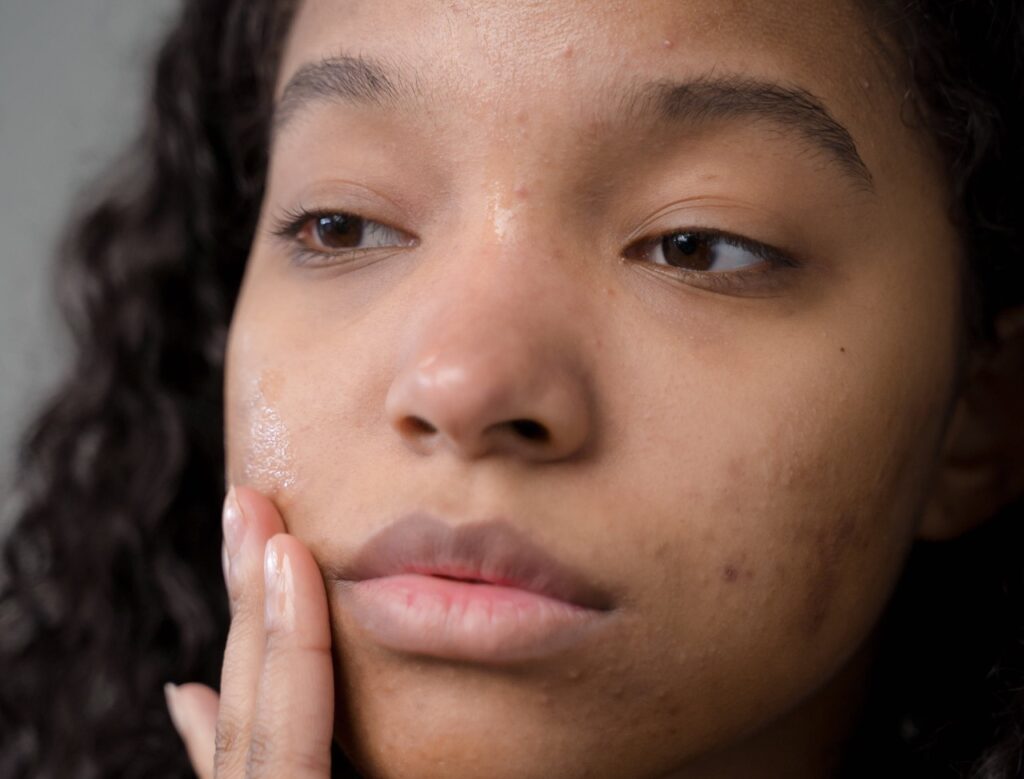Skin Care
What Can Cause Dark Spots On The Skin
Are you growing concerned about dark spots on your skin? It’s time to look into the underlying reasons of these unpleasant imperfections. Dark spots, also known as hyperpigmentation, can be caused by a variety of conditions that impact the synthesis of melanin, the pigment that gives our skin its color.
In this article, we’ll look at the various causes of dark spots and reveal the facts about how they originate. Whether it’s sun exposure, hormonal changes, acne scars, or aging, we’ll look at each aspect and explain how it leads to the formation of these troublesome spots.
Understanding the root causes of dark spots on your skin is the first step toward effective treatment and prevention. With this information, you will be able to make informed decisions regarding the best skincare regimen and lifestyle changes to address this issue head on.
So, if you’re ready to say goodbye to dark spots and hello to a brighter, more radiant complexion, join us on this trip as we uncover the secrets to beautiful skin.

Common Causes of Dark Spots on the Skin
There are a multitude of reasons why dark patches appear on our skin. Understanding the causes is critical for properly addressing and preventing their occurrence.
Sun Exposure and UV Damage
Long-term sun exposure is one of the leading causes of dark patches. The sun’s damaging ultraviolet (UV) radiation can cause melanin overproduction, resulting in dark patches. Frequent sunburns, tanning booths, and insufficient sun protection can all exacerbate the problem. To avoid sun-induced hyperpigmentation, use sunscreen with a high SPF, wear protective clothes, and seek shade during peak sun hours. Furthermore, integrating antioxidants into your skincare routine can help battle the harmful effects of UV rays.
Hormonal Changes and Melasma
Hormonal variations can also contribute to the formation of dark patches, especially in women. Melasma, also known as “the mask of pregnancy,” is characterized by dark areas on the skin. It is frequently caused by hormonal changes during pregnancy or while taking birth control tablets. Melasma can be difficult to treat, but topical treatments containing chemicals such as hydroquinone, azelaic acid, and kojic acid can help fade the spots gradually. Sun exposure can aggravate melasma, thus it’s critical to wear sunscreen whenever possible.

Post-Inflammatory Hyperpigmentation
Post-inflammatory hyperpigmentation occurs when the skin produces too much melanin in response to inflammation or damage, causing dark areas. This form of hyperpigmentation is frequent in people with darker skin tones and can be caused by acne, eczema, psoriasis, or even small traumas such as insect bites or scrapes. To avoid post-inflammatory hyperpigmentation, address the underlying inflammatory condition immediately and avoid picking or rubbing the affected regions. Topical therapies with substances such as retinoids, vitamin C, and niacinamide can help erase these spots over time.
Age Spots and Liver Spots
As we become older, the cumulative effects of sun exposure and the natural aging process can cause age spots, also known as liver spots. These spots usually occur in parts of the skin that are regularly exposed to sunlight, such as the face, hands, and arms. While age spots are harmless, many people seek treatment for aesthetic reasons. Age spots can be treated with topical treatments, laser therapy, chemical peels, or cryotherapy. However, prevention is vital, and using sunscreen every day of your life can significantly reduce your risk of developing age spots.
Medical Conditions and Medications That Can Cause Dark Spots
Certain medical disorders and drugs may also contribute to the appearance of dark patches on the skin. Addison’s illness, hemochromatosis, and some forms of liver disease can all induce hyperpigmentation. Furthermore, certain treatments, such as antibiotics, antimalarials, and chemotherapy therapies, have been linked to the formation of dark spots. If you feel that your dark spots are caused by an underlying medical condition or medication, you should consult a healthcare practitioner for a correct diagnosis and treatment.

Prevention and Treatment of Dark Spots
Now that we’ve covered the numerous causes of dark spots, let’s talk about how to avoid and treat them successfully.
Home Remedies and Over-the-Counter Treatments
Many people opt to begin with home cures and over-the-counter treatments for their dark spots. These alternatives are frequently less expensive and more accessible. Popular natural therapies for fading dark spots include lemon juice, apple cider vinegar, aloe vera, and green tea extract. Over-the-counter therapies including lotions containing hydroquinone, retinol, kojic acid, or vitamin C can also help reduce the appearance of dark spots. However, before applying any new product on your skin, proceed with caution and conduct a patch test.
When to Seek Professional Help for Dark Spots
While home remedies and over-the-counter treatments can help with moderate occurrences of hyperpigmentation, severe or persistent dark areas may necessitate professional care. Dermatologists and skincare professionals can provide a variety of treatments tailored to your unique requirements. Chemical peels, microdermabrasion, laser therapy, and prescription lotions are all possible options. They can also advise on the best skincare routine and lifestyle changes to avoid black spots from appearing again.
To summarize, dark spots on the skin can be produced by a variety of circumstances, including sun exposure, hormone fluctuations, post-inflammatory hyperpigmentation, age, medical problems, and drugs. Understanding the underlying causes is critical to properly preventing and treating dark spots. You can obtain a more even and beautiful complexion by utilizing sunscreen, topical treatments, and getting expert aid as needed. Remember, when it comes to treating dark spots, patience and consistency are essential, so take a complete approach and be gentle with your skin.
So, whether you want to remove existing dark spots or prevent new ones from developing, take the essential precautions to preserve and nourish your skin. With the proper information and skincare routine, you can say goodbye to those pesky imperfections and embrace the gorgeous skin you deserve.
Trusted Health, Wellness, and Medical advice for your well-being


